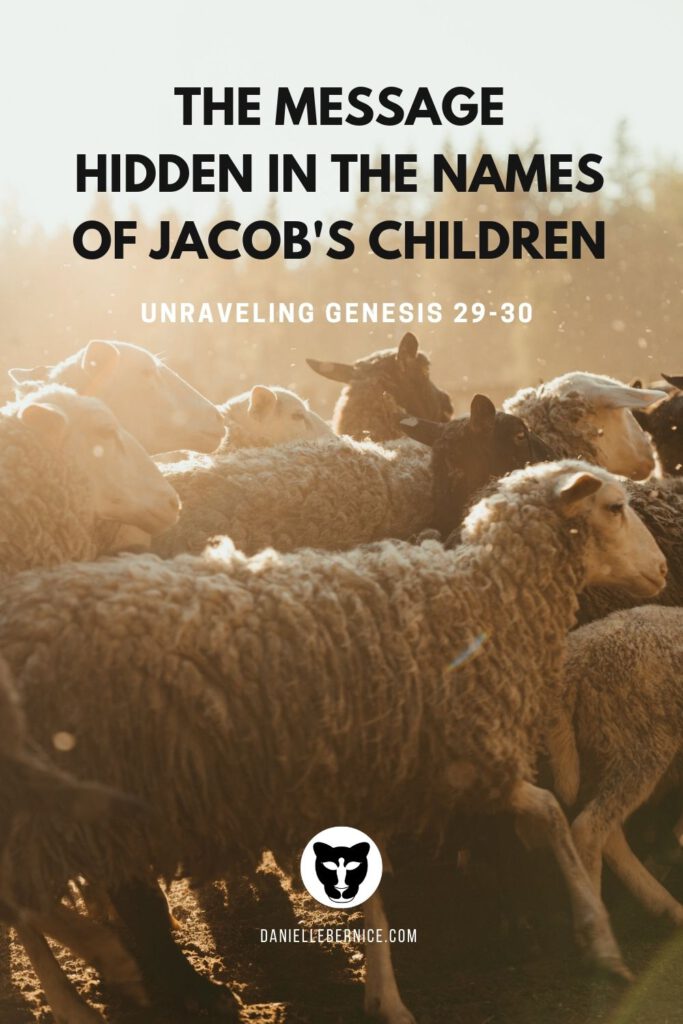The stories of Rachel and Leah hold much more meaning than meets the eye: about 2000 years before Jesus was born, God used these sisters to share His plan for salvation through Jesus Christ.
Jacob’s marriage to Rachel and Leah is quite thought-provoking. What they went through as a family would make for some compelling reality TV today. Romance, deception, jealousy, attention seeking, and a child-bearing competition that tragically ended in death; what does it all mean?
In the previous part of this series, we’ve seen how Jacob’s challenging journey reflects our own journeys with Jesus. In this part, we will take a closer look at Rachel and Leah and the messages about Jesus that are encrypted in their stories.
We pick up the journey at the point where Jacob first met Rachel in Genesis 29. Their encounter is filled with symbolic moments. Let’s look at the ones that stood out to me the most.
Why every good love story starts at a well
“Then Jacob went on his journey and came to the land of the people of the east. As he looked, he saw a well in the field, and behold, three flocks of sheep lying beside it, for out of that well the flocks were watered. The stone on the well’s mouth was large, and when all the flocks were gathered there, the shepherds would roll the stone from the mouth of the well and water the sheep, and put the stone back in its place over the mouth of the well.” (Genesis 29:1-3, ESV)
The fact that Jacob found his bride-to-be, Rachel, at a well, is significant. And it is no coincidence that his father’s wife Rebekah was also found at a well (Genesis 24). The Bible uses the image of a woman at a well more often, and I believe that these are “hints” from God, pointing us to Jesus collecting His bride.
Let me expand on that a little.
We know from the Bible that Jesus calls Himself the Source of Living Water. By Living Water, He means the Holy Spirit: “On the last day of the feast, the great day, Jesus stood up and cried out, “If anyone thirsts, let him come to me and drink. Whoever believes in me, as the Scripture has said, ‘Out of his heart will flow rivers of living water.’” Now this he said about the Spirit, whom those who believed in him were to receive, for as yet the Spirit had not been given, because Jesus was not yet glorified.” (John 7:37-39, ESV)
We can see this symbolism throughout Scripture. For example, the “well of living water” in Song of Solomon 4:15, a Book dedicated to the celebration of love between a bride (on the deepest level a symbol of the Church, Christ’s “Sister”) and her bridegroom (a symbol of Jesus).
We also see the symbolism in the book of Jeremiah 2:13 and 17:13 in which the Lord mentions the appalling acts of His people: forsaking the true Source of Living Water while running to other self-made “sources”.
When you read the story with this symbolism in mind, you can uncover an interesting link:
The stone over the mouth of the well had to be rolled away at a specific time to provide water to the thirsty sheep. Similarly, the stone covering Jesus’ grave was rolled away at the appointed time so that Jesus could provide Living Water to His thirsty sheep.
When we come to the Well of Living Water and drink from it, we receive His Spirit. And since God is love, receiving His Spirit means receiving His love. That is why every good Love story, including yours, starts at the Well.
Meeting Jesus
When Jacob told Rachel who he was, Rachel ran home to tell her father the good news, leaving her sheep behind (Genesis 29:9-12). Little did she know that she would become a mother to a totally new flock: God’s people.
This excitement foreshadows what was to happen between Jesus and another woman at a well: the well-known story of the Samaritan woman (John 4). This beautiful event depicts a woman who didn’t really belong to anybody. She was looked down upon because she:
- was a woman
- was a Samaritan (which implied a faith that was considered imperfect by the Jews)
- had been with many men who either left her or did not want to marry her.
I imagine that she must have felt unloved, lonely, rejected, and ashamed. But Jesus saw her, knew her, and did not reject her. I believe that in a spiritual sense, Jesus came to the well to claim a woman who belonged to Him.
But instead of seeing Jesus for Who He is, the Samaritan woman was focused on the greatness of her forefather Jacob to whom the well belonged. Yes, the same Jacob, who met his wife at a well; that makes this meeting point extra meaningful.
Jesus, in turn, contrasted the well filled with physical water with the Well filled with Living Water. The first was seen, but could only sustain temporary life here on earth. The second cannot be seen while it gives eternal life. The choice is simple: either you belong to the world and its temporary works and be subject to death, or you belong to Christ and receive His eternal life through faith.
Once the woman began to realize what that meant, she asked Jesus for Living Water, and He gave her words of knowledge, including the revelation that Jesus is Christ, the Messiah. Then she left overjoyed, leaving her physical water behind, taking spiritual water with her. Her testimony brought many people to faith in Jesus.
[The text continues after the image.]

The first will be the last
The story of Jesus meeting the Samaritan woman at the well is remarkable for many reasons. One of those reasons is the notable fact that Jesus purposefully met with someone unloved and imperfect to make her fruitful (John 4:39-42). And isn’t that what happened with Leah? Leah wasn’t as pretty as her sister, and she had weak eyes, therefore, Jacob wasn’t attracted to her. So, using Laban’s deceptiveness, God saved Leah from sorrow by giving her to Jacob first and making her the first to bear fruit: “When the Lord saw that Leah was hated, he opened her womb, but Rachel was barren.” (Genesis 29:31, ESV).
Interestingly, Jacob himself was pushed forward by God in a similar manner. His brother Esau was most loved by their father, but, through deception, Jacob received the blessing of the firstborn instead of Esau (Genesis 27).
Jesus always truly saw the people who were perceived as less worthy than others: those who were hated, poor, afflicted, and living on the outskirts of society. They were viewed as the “ugly” side of society, and those who were self-righteous turned their backs on them. But Jesus, in all His righteousness, did not turn His back on them. Instead, He restored them and set them free from their misery.
And that is what He does to this day. I am living proof of the fact that God, for His glory, still lifts those who are hated and afflicted out of their misery. He gives Living Water to the ones who are thirsty for the Truth and gives them a purpose in sharing the Good News of Christ.
Provoked to jealousy
Upon their return, Jesus’ disciples marveled at the fact that Jesus was talking with a woman (John 4:27).
Instead of asking about the situation or the reason for the woman’s joy (which is spiritual food and living water), they were solely concerned about what was visible: physical food and the woman’s gender.
You see, most of God’s initial people, the Israelites, were and are blind to the Truth of salvation; they hear, but don’t understand, they see, but don’t perceive (Matthew 13:15-16, Isaiah 42:18-20). That is why God brought salvation from the Jews to the Gentiles; because of His own jealousy for His people, He wanted to make the Israelites jealous and even angry so that they would seek Him too and be saved (Deuteronomy 32:21, Romans 10:20, 11:11-14).
This corresponds with the fact that Leah was given a husband and children first, which made Rachel jealous of Leah. And although their means might appear somewhat questionable, by the grace of God, their jealousy and indignation sure led to much fruit! They literally gave it all they got.
When the time came to follow their husband to his homeland, they did so willingly, saying that they had no inheritance left in the house of their father since God gave Laban’s wealth to their husband (Genesis 31:14-16).
We should do the same. All authority has been given to Jesus, our Bridegroom. In Him, we have our inheritance, and we should follow Him to His homeland, leaving the world and its ruler behind us. The Bride of Christ should continue to seek unison with the Bridegroom and produce as much spiritual fruit with Him as possible. In that process, a divine jealousy should motivate us to become more fruitful and bring more of God’s people to God, where they belong.
[The text continues after the image.]

Purposed to conceive God’s people
If you are familiar with my writing, you might know that I deeply believe in God’s providence and often praise Him for unfolding His plan for mankind in every layer of the Scriptures. That is one of the reasons why I love digging deep into God’s Word; It is filled with treasure.
The Word always points to Jesus because Jesus is the Word in the flesh (John 1:1,14). That implies that anywhere we look in the Word, we will always find a reference, picture, symbol, or prophecy pointing to Jesus, especially with the help of the Holy Spirit.
Years ago, while digging into God’s Word, I discovered that God’s good purposes can be found in even the names of people who play a role in the Word. Names are important to God; you can find about a thousand mentions of the word “name” in the Bible, which is a lot more mentions than even the word “love” (almost 700 times).
Sometimes, God makes clear that He prophesies through the giving of names, of which we see examples in Hosea 1 and Isaiah 8. However, even in cases where it’s not explicitly mentioned, names seem to align perfectly with God’s plans. We can see the same in this story.
Rachel’s name means “ewe” (female sheep) and Leah’s name means “wild cow” or “wearied”. To Western ears, these meanings don’t sound very flattering, I know. But to me, their names are interesting since Jesus tenderly calls His followers sheep, and because it aligns with the fact that they (together) brought forth the flock of God’s people (Ruth 4:11).
But, perhaps even more interesting are the names that they gave to their sons, because we see that the Word gives a lot of attention to the naming of the children born to Jacob.
Salvation through Jesus foretold in the names of Jacob’s children
Nothing God does is without reason, so when God highlights something in His Word, we must pay extra attention. There has to be something that we can learn from the naming of Jacob’s children. So, let’s take a closer look at the meaning of their names:
- Reuben – behold, a son
- Simeon – he who hears
- Levi – joined
- Judah – let Him be praised
- Dan – (He) judged
- Naphtali – my wrestling
- Gad – good fortune
- Asher – happy
- Issachar – there is a reward/wages/recompense
- Zebulun – dwelling/exaltation/honor
- Joseph – He will add
- Benjamin – son of the right hand
I put their names in birth order. When you read the meaning put together, doesn’t it sound like the story of Jesus’ life in the order it took place?
The names of the first 4 sons form the message: “Behold a son! He who hears, joined, let Him be praised.” Praise God indeed that He came to earth to join His people!
The 4 middle sons were born from the slaves of Leah and Rachel, and if we look at the meaning of their names and what Rachel and Leah say about them (Genesis 30:8-13), the message within their names could say something like: “He judged my wrestling. Good fortune [has come]! [I am] happy!”
You could say that this speaks about Jesus being judged, crucified, and fortunately resurrected, with great (eternal) joy as a result. But you could also broaden this message to say that God sees our struggles and hard work and that it will eventually lead to great joy.
Both meanings align with Jeremiah’s prophecy about Rachel weeping for the death of her children and God responding with a promise of reward for her work, and of restoration and joy through a new Covenant (Jeremiah 31:15 ff., Matthew 2:18).
The names of their last 4 sons read “There is a reward. Honor He will add [to the] Son of the right hand.” The first part could refer to the reward Jesus got (being exalted to be seated at the right hand of God in heaven) and/or to the wages He paid for our sins.
And whichever meaning of the name Zebulun you use; it continues to tell us that Jesus was honored, and exalted to dwell at the right hand of Power (Matthew 26:64).
When you add the name of daughter Dinah (meaning ‘judged’ or ‘vindicated’) to the list, it should be inserted between Zebulun and Joseph, as she was Leah’s last-born. Her name makes the sentence even more powerful, as we are either judged or vindicated by the One Who sits at the right hand of God.
Now compare this to what Isaiah prophesied: “Say to those who have an anxious heart, ‘Be strong; fear not! Behold, your God will come with vengeance, with the recompense of God. He will come and save you.’” (Isaiah 35:4, ESV).
Or perhaps what Jesus said in John 5:22-24 (ESV) is even more striking: “For the Father judges no one, but has given all judgment to the Son, that all may honor the Son, just as they honor the Father. Whoever does not honor the Son does not honor the Father who sent him. Truly, truly, I say to you, whoever hears my word and believes him who sent me has eternal life. He does not come into judgment, but has passed from death to life.”
Isn’t that amazing?
To some, these connections may sound “coincidental,” but when I first saw them, it truly felt like I had dug up a huge pearl. Because if you believe that God has His hand in everything and is fully in control, coincidences cease to exist.
It is comforting to know that God has planned everything in advance, and He knows what He is doing. He planned you and He planned me; He knew everything about us, even before we were born (Psalm 139:13-16). God does not make mistakes; you and I are His handiwork and part of His glorious plan to fulfill a purpose as His holy people. Amen.
Read the next part of this 5-part series here: https://daniellebernice.com/articles/when-blessings-hurt/

